Solar pumps have become increasingly popular due to their eco-friendly nature and cost-effectiveness. They are a great alternative to traditional pumps that rely on electricity or fuel. However, choosing the right type of solar water pump for your customer’s needs can be challenging, as there are many different types available.
In this guide, we will explore the different types of solar water pumps, so that an informed decision can be made. Whether looking for an agriculture solar water pump for livestock or solar pumps for residential use, WHC Solar has a wide range of high-quality solar water pumps to meet your customer requirements.
The Basics of Solar Water Pump
Now, let us discuss the main components of the solar pumping system and how it works:
The main components of the solar pump system
The main components of a solar water pumping system include solar panels, a pump controller, and a DC water pump.
Solar panels
They capture energy from the sun and convert it into electrical energy, which is then used as solar power for the water pump.
The pump controller
It regulates the amount of power supplied to the pump and protects it from damage due to overvoltage or under-voltage.
The water pump
This is specifically designed to operate on DC/AC power and draws water from a well, borehole, or surface source.
In addition, a water storage tank and a backup battery system may also be included in the system to ensure a reliable water supply during periods of low sunlight or at night.
How do solar pumps work?
Now, how does a solar water pump work? Solar pumps work by using solar panels to convert sunlight into electrical energy, which powers a DC water pump. The solar panels generate direct current (DC) electricity that is sent to the pump controller, which manages the flow of electricity to the pump. The pump controller ensures that the pump operates at maximum efficiency and prevents damage due to over-voltage or under-voltage.
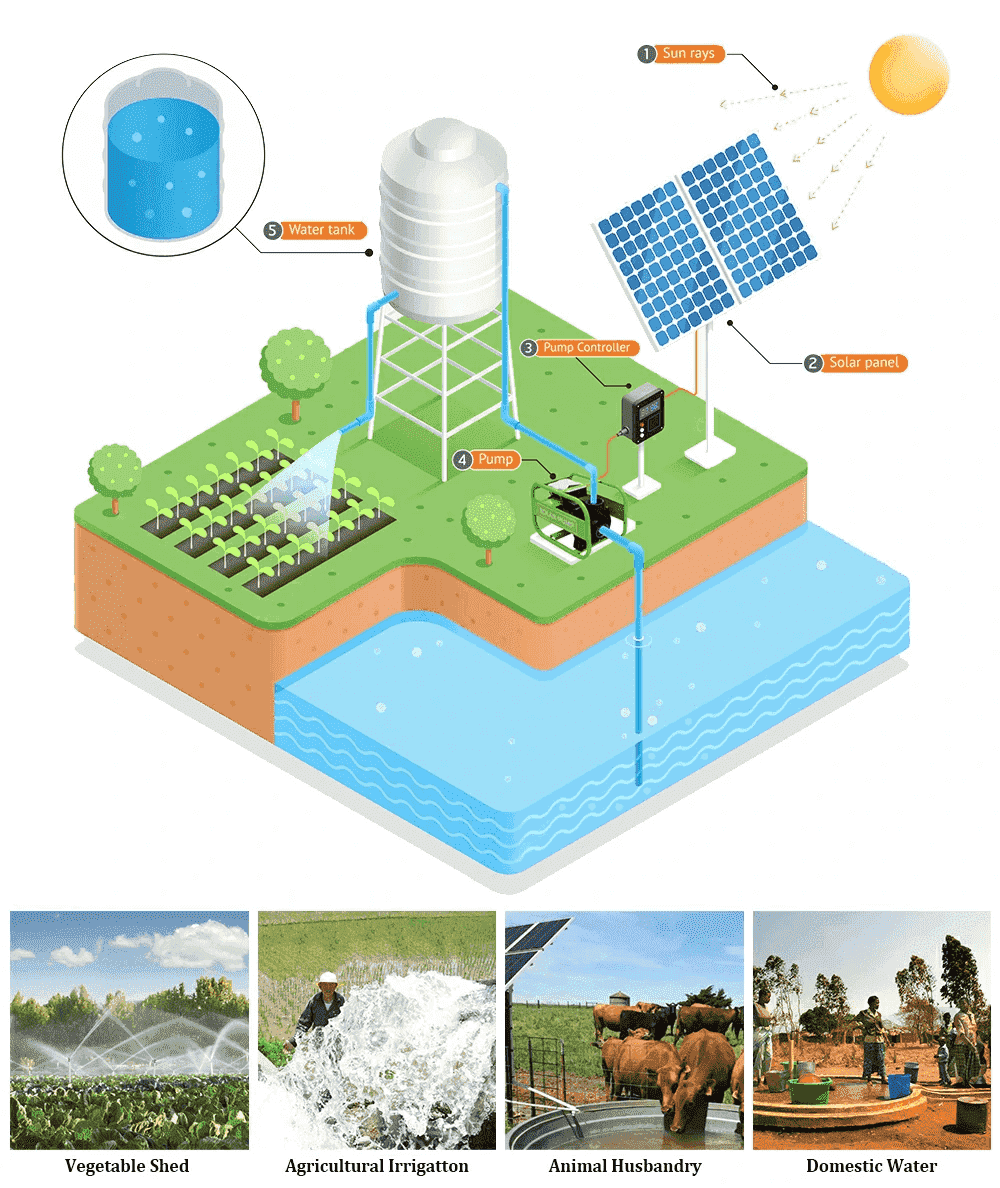
In addition, the DC water pump then draws water from a well, borehole, or surface source and pumps it to the desired location.
Four Major Types of Solar Pump
The solar water pump is becoming increasingly popular for its efficiency and low environmental impact. There are four major types of solar pumps available in the market, each with its own set of advantages and applications. In this section, we will discuss each type of solar pump in detail.
Submersible Solar Pumps
Submersible solar pumps, also known as solar pumps for irrigation are designed to be placed underwater, such as in a well, borehole, or pond. They can pump water from great depths and are ideal for applications that require water to be lifted from deep sources. Submersible pumps are more efficient than surface pumps as they require less energy to pump water from deeper depths. These pumps can be powered by both AC and DC solar panels, making them a versatile option for a range of applications.
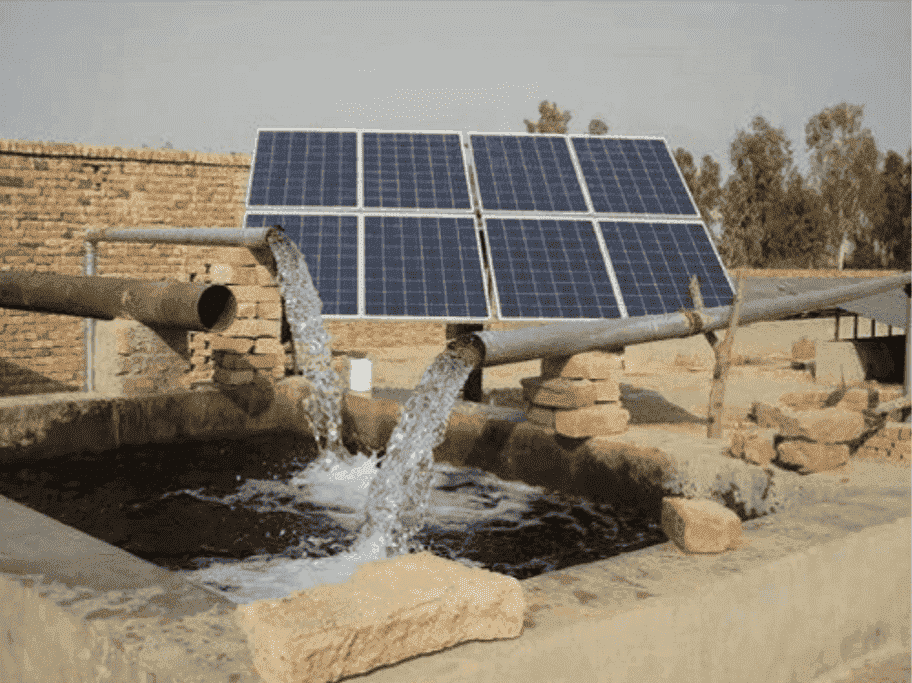
Surface Solar Pumps
Surface solar pumps are designed to be placed on the surface of the water source, such as a lake or river. They are less expensive than submersible pumps and are easier to install and maintain. Surface pumps can be used for applications that require water to be lifted from shallow sources. They are commonly used for small-scale irrigation, livestock watering, and domestic water supply. Surface pumps can be powered by both AC and DC solar panels.
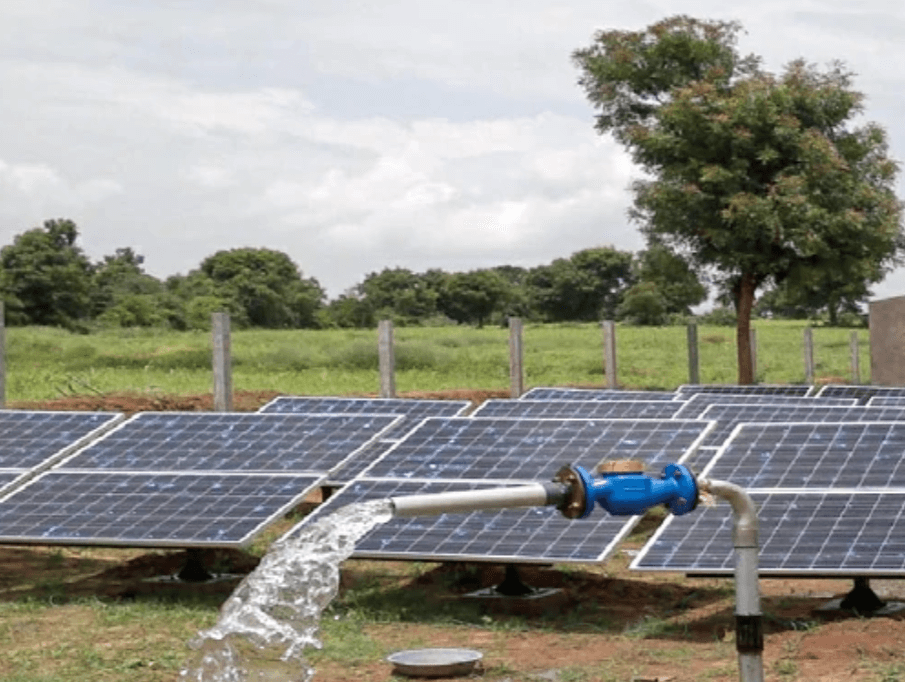
DC Solar Pumps
DC solar pumps are designed to be powered by DC solar panels. They are ideal for off-grid applications where electricity is not available or is too expensive. DC pumps can be used for a variety of applications, such as irrigation, livestock watering, and domestic water supply. DC pumps are more efficient than AC pumps as they do not require an inverter to convert the DC power to AC power, which results in less power loss during the conversion process. Solar DC pumps are also less expensive than AC pumps and require less maintenance.
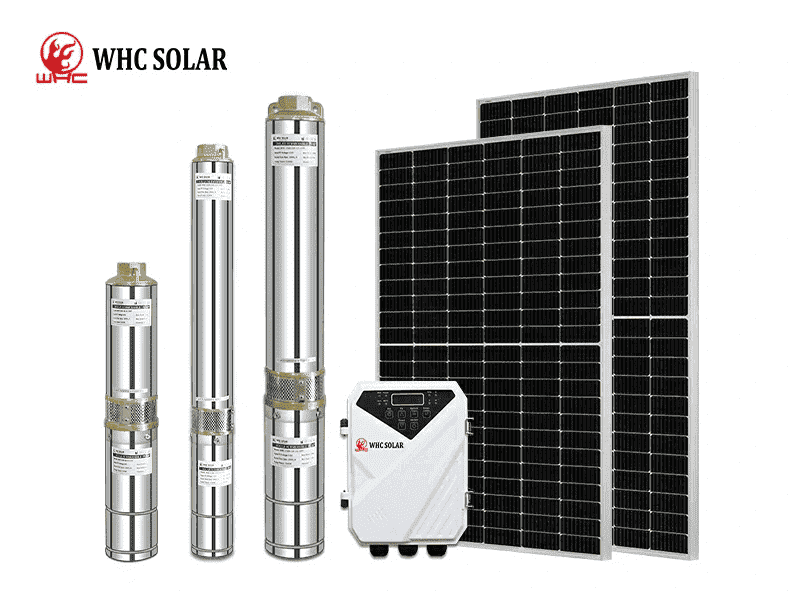
AC Solar Pumps
AC solar pumps are designed to be powered by AC solar panels. They are more expensive than DC pumps and require an inverter to convert the DC power generated by the solar panels into AC power. AC pumps are ideal for applications that require a higher flow rate or pressure. They are commonly used for large-scale irrigation and commercial water supply. AC pumps are also more versatile than DC pumps as they can be powered by both solar panels and grid electricity.
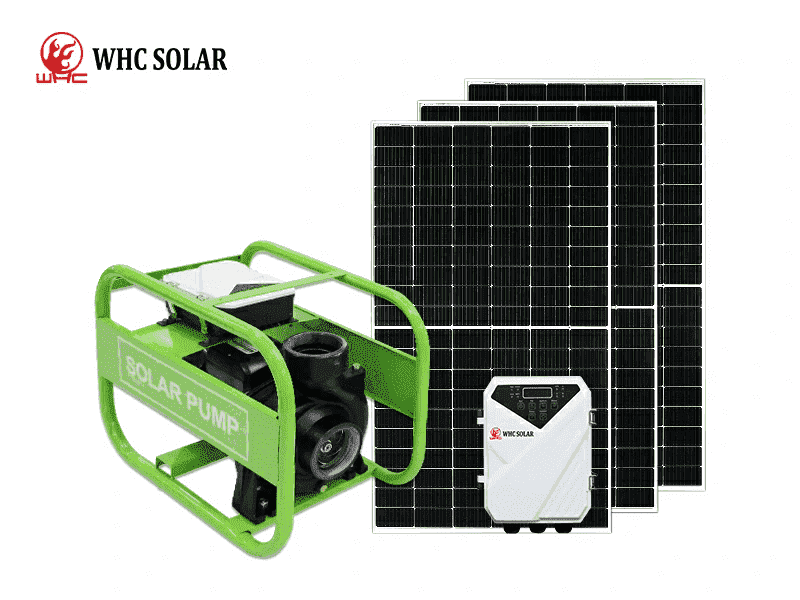
In conclusion, solar power water pumps are an efficient and sustainable option for a range of applications. AC and DC pumps are the most popular types of solar pumps, with each type having its own set of advantages and applications. At WHC Solar, we specialize in providing high-quality solar pump systems for a range of applications. Our expert team can help choose the right solar pump for customer-specific needs, ensuring maximum efficiency and performance.
Applications for Solar Water Pump
Solar powered water pumps have a wide range of applications in different fields. The following are some of the applications of solar water pumps:
Farmland Irrigation
Solar water pumps can be used for farmland irrigation where there is no access to grid electricity. They can help farmers increase crop yields and productivity by providing water for irrigation. The pumps can be designed to pump water from wells or boreholes and distribute it to the crops through a drip irrigation system. This method is more efficient than traditional flood irrigation, as it reduces water loss due to evaporation and runoff.
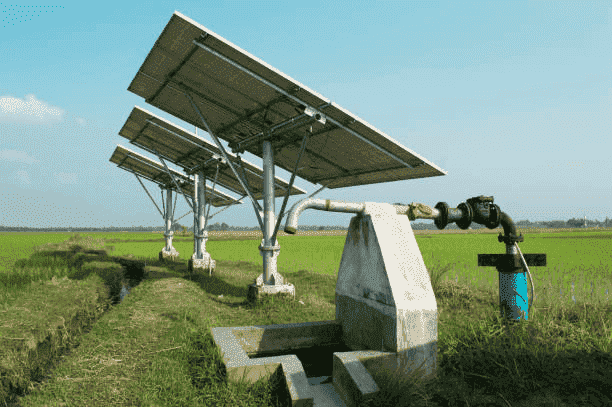
Vegetation Irrigation in Barren Hills
Solar water pumps can be used to irrigate vegetation in barren hills where there is no access to grid electricity. This application is particularly useful in areas that experience drought or desertification. The pumps can be used to pump water from underground sources, such as wells or boreholes, and distribute it to the vegetation through a drip irrigation system. This method is more efficient and cost-effective than using traditional irrigation methods, such as manual watering or trucking water to the site.
Water for Livestock and Pasture Irrigation
They can also be used to provide water for livestock and irrigate pastures. They can help ranchers and farmers increase the health and productivity of their livestock by providing a reliable source of water. The pumps can be used to pump water from wells, boreholes, or surface water sources, such as rivers or ponds, and distribute it to the livestock through troughs or water tanks. This method is more efficient and less labor-intensive than manually hauling water to the site.
Governance of Soil Erosion Protection
Solar water pumps can be used to prevent soil erosion by providing water to areas that are prone to erosion. The pumps can be used to pump water from underground or surface sources, such as wells or rivers, and distribute it to the soil through a drip irrigation system. This method helps to stabilize the soil and prevent erosion, which can help protect the environment and maintain soil fertility.
Provide Safe and Secure Water in Remote Areas
It can be used to provide safe and secure water in remote areas where there is no access to grid electricity or clean water sources. The pumps can be used to pump water from underground or surface sources and distribute it to the community through a water distribution system. This method is more cost-effective and sustainable than traditional water supply methods, such as trucking water to the site.
Advantages and Disadvantages of Water Pumps with Solar Power
Moving on to the advantages and disadvantages of water pumps with solar power:
Advantages of solar water pumps
Solar water pumps offer several advantages over traditional pumps that are powered by electricity or diesel generators.
No fuel cost
One of the most significant benefits is that solar pumps do not require any fuel, making them highly cost-effective in the long run. This means that once installed, there are no ongoing fuel costs to worry about, unlike traditional pumps that require regular refueling.
Low labor and maintenance costs
Another advantage of solar water pumps is their low labor and maintenance costs. Since they have fewer mechanical components, they are less prone to wear and tear, resulting in lower maintenance costs. Furthermore, solar pumps require very little human intervention and can operate autonomously, which reduces labor costs.
Environmentally friendly
Solar water pumps are also environmentally friendly, emitting zero carbon emissions and reducing the reliance on fossil fuels. This makes them an excellent option for those who are concerned about the environmental impact of traditional pumps.
Suitable for remote areas
Finally, solar water pumps are highly suitable for remote areas where access to electricity is limited or non-existent. They can be installed in even the most remote locations, providing a reliable source of water without the need for grid electricity or fuel delivery.
Major disadvantages
Some of the disadvantages of solar water pumps are:
Expensive up-front costs
One disadvantage of solar water pumps is that they have high up-front costs. The initial investment required for purchasing and installing a solar pump is often higher compared to traditional pumps, which can be a barrier to adoption for some users.
Unable to work when it is dark
Another disadvantage of solar water pumps is their inability to work when it is dark. Since they rely on solar energy to function, they can only operate during daylight hours, which can limit their usefulness in areas with shorter daylight hours or during times of heavy cloud cover. However, this can be mitigated by using battery backup systems or hybrid systems that combine solar and other energy sources.
An ideal supplier of solar pumping solutions: WHC SOLAR
WHC SOLAR is a solar water pump manufacturer, offering a range of high-quality solar pumps that are suitable for a variety of applications. With a commitment to innovation and sustainability, WHC SOLAR provides cutting-edge solutions that are both efficient and cost-effective.
One of the key advantages of WHC SOLAR’s solar pumps is their high working efficiency. Using advanced technology and materials, these pumps can deliver high flow rates while consuming minimal energy. This translates to lower costs and higher output, making them an excellent choice for a range of applications.
WHC SOLAR’s solar pumps are also built to last, with high-quality materials and components that ensure long-term durability and reliability. They are IP65 waterproof, which means they can withstand harsh weather conditions, making them suitable for outdoor use in a variety of settings.
Moreover, WHC SOLAR offers a range of customizable options to meet the specific needs of each customer. This includes options for different pump sizes, flow rates, and power outputs, ensuring that each customer can find the perfect solution for their unique needs.
Overall, WHC SOLAR’s solar pumping solutions are an excellent choice for anyone seeking a reliable and cost-effective way to pump water using renewable energy. With their advanced technology, durable materials, and customizable options, these pumps are a top choice for a range of applications, from solar water pump agriculture like solar irrigation pumps to providing clean water in remote areas.
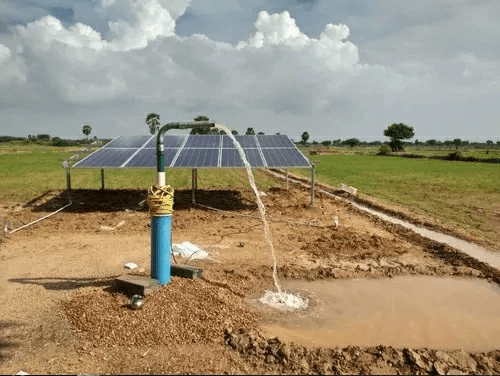
Conclusion
In conclusion, understanding the different types of solar water pumps and their applications is crucial when considering a sustainable water pumping solution. WHC SOLAR is an ideal supplier of solar pumping solutions, offering a range of high-quality solar pumps that are efficient, durable, and customizable. Their products provide numerous advantages, including no fuel costs, low labor and maintenance costs, and environmental friendliness. Despite some disadvantages, such as high up-front costs and the inability to work when it’s dark, water pump with solar power are still a great investment for those seeking a reliable and sustainable water pumping solution. By partnering with WHC SOLAR, customers can rest assured that they are receiving the best in solar pumping technology and expertise.

